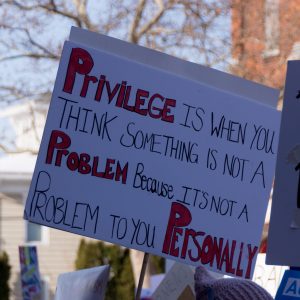When fashion designer Laura Siegel first heard about last year’s Rana Plaza garment factory collapse in Bangladesh, she was upset. But not shocked.
“I’ve never worked in Bangladesh, but I spent a lot of time in India,” she said. “To be honest, I wasn’t so surprised that something like that could happen, mainly because I’ve witnessed first hand what some of the factory conditions can be like.”
As a designer based in Toronto and New York, Siegel likes to research factories before beginning a line of clothing. She works with artisans internationally and has toured factories in both China and India.
And she wasn’t always impressed with what she saw.
“It’s OK to walk into a building where there are no signs and it’s dirty. To be honest with you, that’s something that isn’t so bad,” she said. “But when you walk into an environment where there’s X amount of sewing machines per square footage and X amount of people per square footage… it’s just work, make mistakes, get yelled at – those are the worst scenarios I’ve witnessed.”
Which is why Siegel, 26, decided to act.
“I was talking with my parents about what we could do, what do you do after something like this? Because you can’t just do nothing,” she said of the collapse, which killed 1,127 workers.
“We decided it’d be a good idea to do something that would raise awareness, that would get people thinking about who made [their clothes] and what their lives are like.”
Eventually, project Eleven27 was born. Siegel decided to work with local artisans in India who would hand weave 1,127 scarves – made from reused saris – to honour each person who died in the tragedy.
“We wanted to do something in honour of individuals who lost their lives. What happened was a very big wake-up call,” she said.
Proceeds from the sale of the scarves will go directly to the affected families in Savar, Bangladesh. For her initiative, Siegel partnered with Sreepur Village Organization, a group that’s working with the victims’ children to make sure they’re taken care of. The organization is also helping the victims’ families manage any money they received after the tragedy by setting up bank accounts.
Eleven27 launched on April 24, exactly a year after the factory – which was constructed illegally – collapsed.
“[Community support] has been unbelievable. So many people came out to the launch,” Siegel said, adding that Holt Renfrew supports the campaign and is selling some of the scarves at its stores.
For Siegel, it was important that the scarves were made by Indian artisans in a safe work environment.
“[I wanted] for each scarf to be handmade, for each scarf to have thought that went into it, and whoever was making these scarves, whether it was an individual or a family, that they were able to do so in a nice work environment,” she said.
Siegel decided to work with a family in Kutch district in western India.
“The father is a master weaver and the son also weaves. He brought in weavers from the community to hand-make all the scarves and the wife also helps him,” she said.
Aside from Holt Renfrew, scarves can be purchased online at laurasiegelcollection.com.






